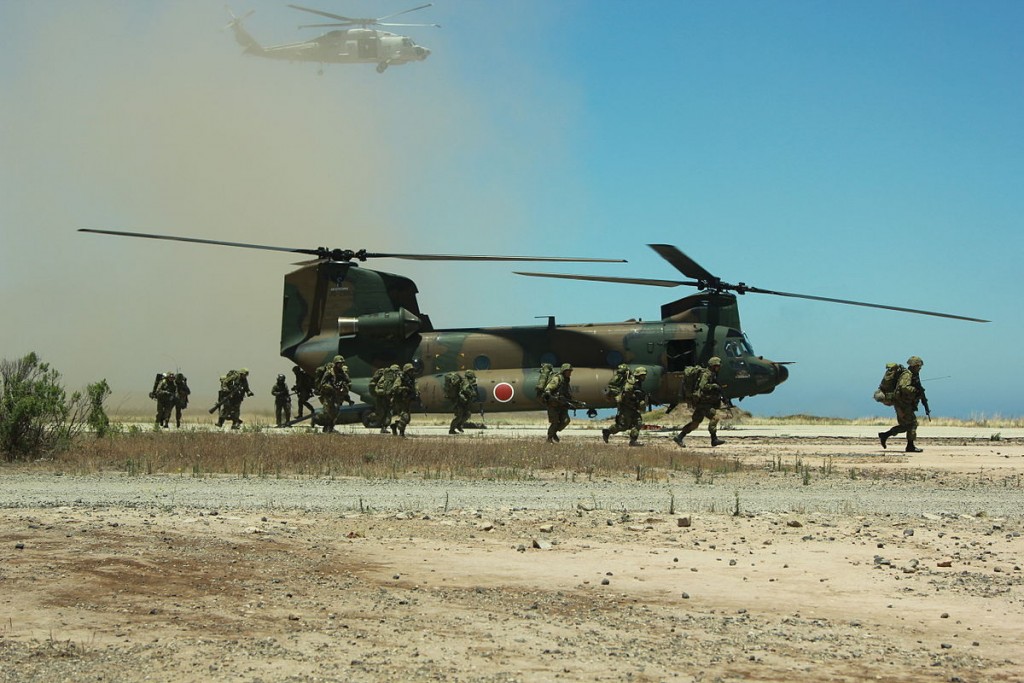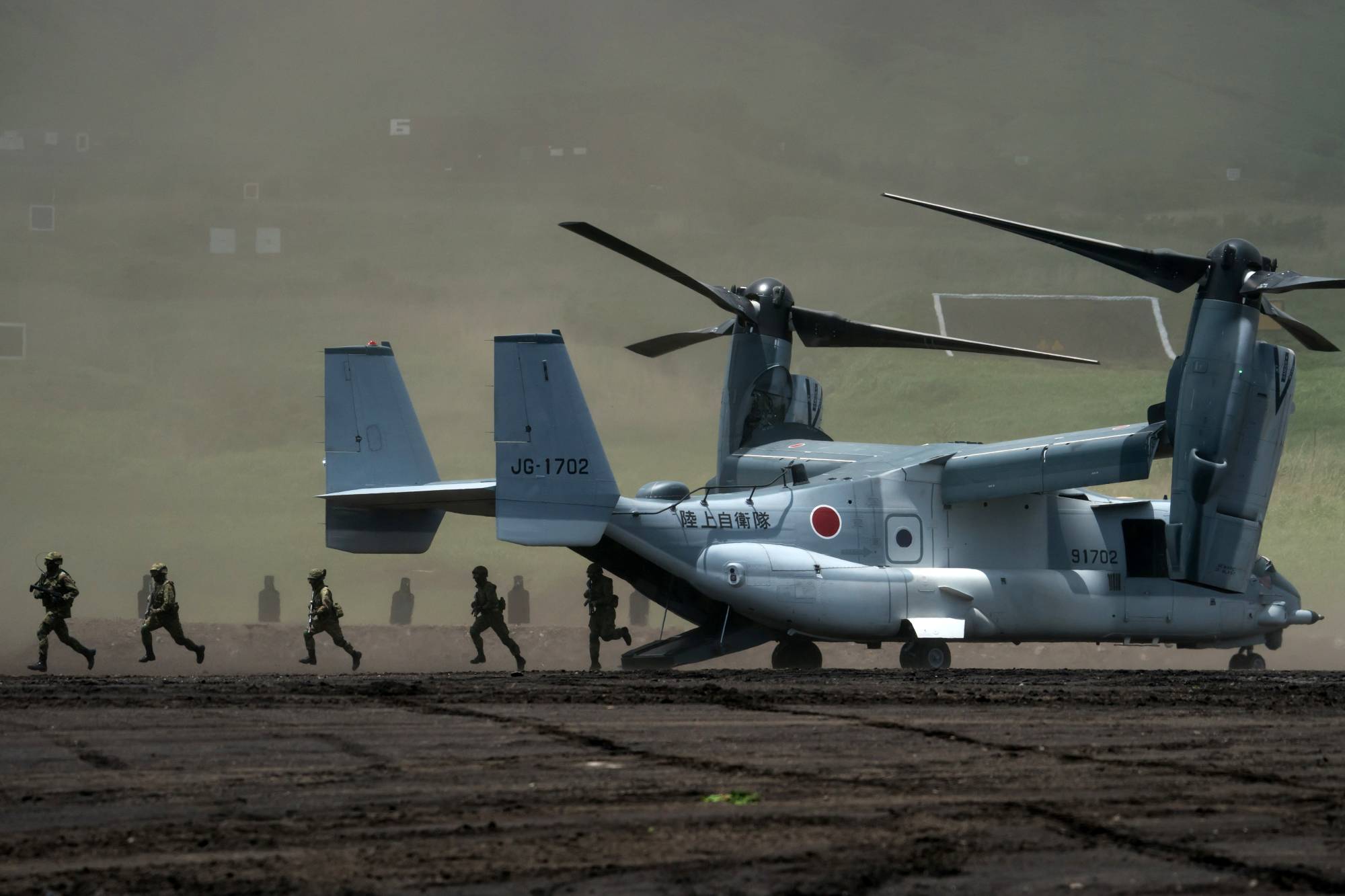80% in Japan oppose tax hike plan to cover defense spending, poll finds

Ground Self-Defense Force members disembark from a V-22 Osprey aircraft during the annual live-fire exercise at East Fuji Maneuver Area, in Gotemba, Shizuoka Prefecture, in May last year. | POOL / VIA REUTERS
May 7, 2023
A total of 80% of respondents to a Kyodo News poll said they are against possible tax hikes to finance
Japan’s substantial defense buildup plan, despite an overwhelming majority expressing concern about China potentially taking military action against Taiwan, the survey showed Saturday.
The poll, carried out by mail from March to April, showed that while the Japanese public sees a need to boost the country’s defense capabilities to some extent due to a deteriorating security environment, they are reluctant about increasing defense spending considerably or financing them through taxes.
In the survey, only 19% showed support for Prime Minister Fumio Kishida’s call to
finance a portion of defense spending by taxes, with the government deciding in December to boost defense spending by more than 50% to ¥43 trillion ($319 billion) in five years from fiscal 2023.
In a major shift in security policy for a country that still maintains its pacifist postwar Constitution, the government has set itself the goal of bringing the annual defense budget and related expenses to 2% of gross domestic product by fiscal 2027.
Nearly 60% said the five-year defense buildup plan was “not appropriate,” while 88% said Kishida’s explanation regarding drastically enhancing Japan’s defense is “not sufficient.”
When asked about their main reason for disapproving of the tax hikes to cover the rise in defense spending, the largest group of 48% said it was “because the public cannot bear further tax burdens.”
On the possibility of
China taking military action in a bid to unify Taiwan, a self-ruled island that Beijing views as its territory, with the mainland, 53% of the respondents said they are “extremely concerned” and 36% said they are “concerned somewhat.”
Asked about potential desirable responses in the event of a Taiwan contingency, 56%, the largest group, preferred that Japan engage in diplomatic efforts and nonmilitary measures, such as imposing economic sanctions.
A total of 80% of respondents to a Kyodo News poll said they are against possible tax hikes by the administration of Prime Minister Fumio Kishida to finance Japan’s substantial defense buildup plan. | KYODO
At 33%, the second largest group said Japan should provide logistical support to the United States, its key security ally, that could step in to defend the democratic island against a possible Chinese invasion.
The survey, which focused on national security issues, targeted 3,000 men and women in Japan age 18 and over. The questionnaire was sent on March 7 and 2,043 responses were received by April 17, of which 1,959 were considered valid.
A total of 61% said they support
Japan’s decision to acquire so-called counterstrike capabilities that can hit targets inside an adversary’s territory, which the government says will enhance deterrence. But 36% were against obtaining the technology.
The majority approving Japan developing the new capabilities apparently represents a recognition of an increasingly severe security environment amid China’s military rise, North Korea’s missile and nuclear weapon development and Russia’s war on Ukraine.
Nearly 60% said possessing counterstrike capabilities would contribute to an arms race with neighboring countries, and 53% said obtaining the capabilities would make the country’s exclusively defense-oriented policy a dead letter or, if they had to choose, said they would choose for it to be so.
Regarding the country’s strict regulations on
exporting defense equipment, 20% backed a plan considered by the government to embargo exports of lethal weapons, while the largest group, at 54%, said the exports should be limited to nonlethal areas.
Talks began inside Japan’s ruling coalition parties in late April
to review the rules, as calls grow for the Asian country to play a bigger role in the global security arena at a time when major Western countries are providing military aid to Ukraine.
Meanwhile, the survey showed that 76% of respondents either did not know at all or knew little of Japan’s new national security strategy and related documents approved in December, which included the plan to obtain counterstrike capabilities and boost its defense spending.
The result indicates Kishida may need to make more effort to communicate with the public so as to win their support for the new defense policies, including the tax hikes.
Regarding the Group of Seven summit to be held in Hiroshima later this month, respondents were split over whether the gathering would contribute to increased momentum for a world without nuclear weapons — a vision Kishida has been pitching.
The unwillingness to accept tax hikes to cover defense outlays comes despite 53% saying they are 'extremely concerned' over China taking military action against Taiwan.

www.japantimes.co.jp





